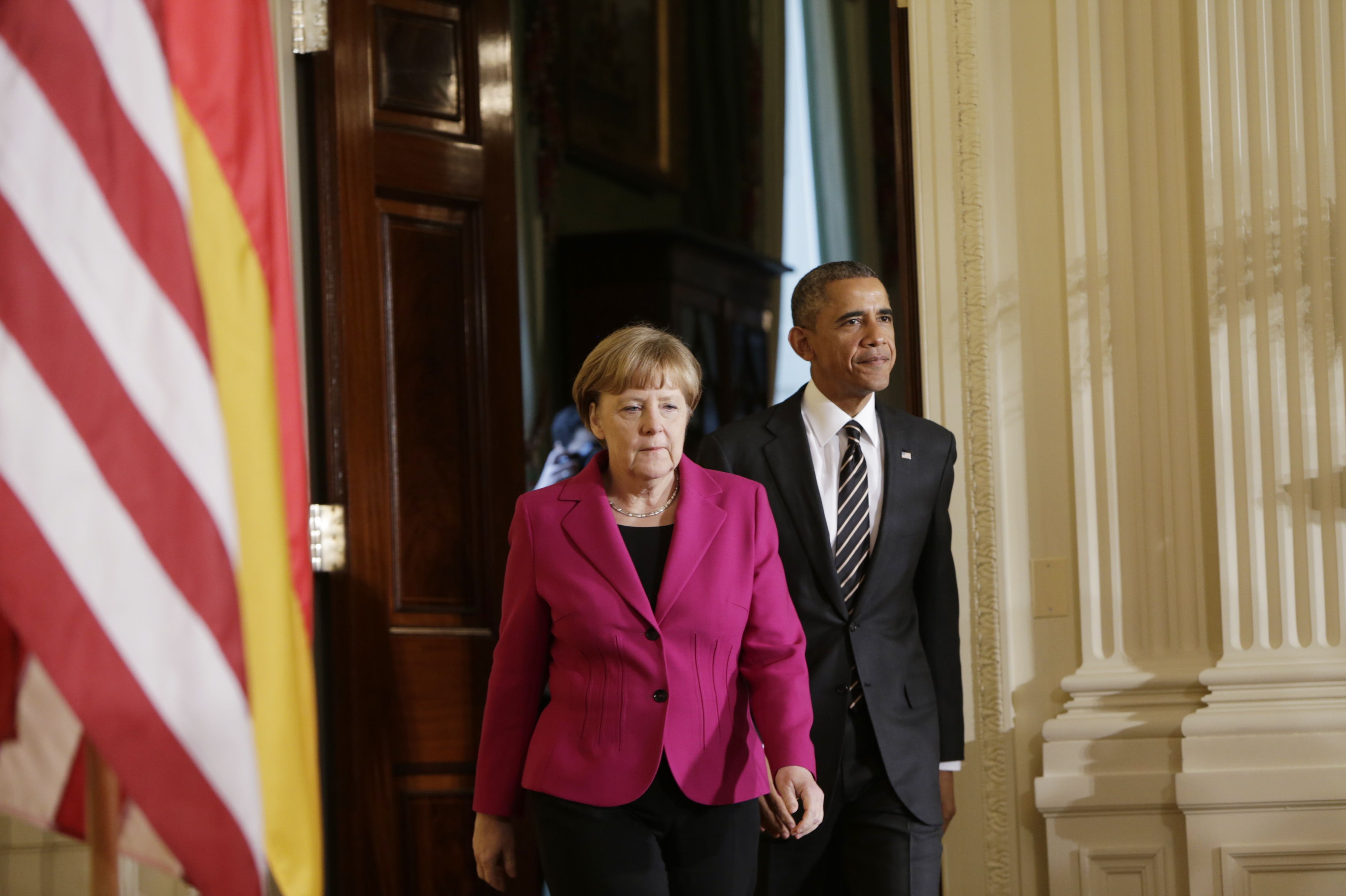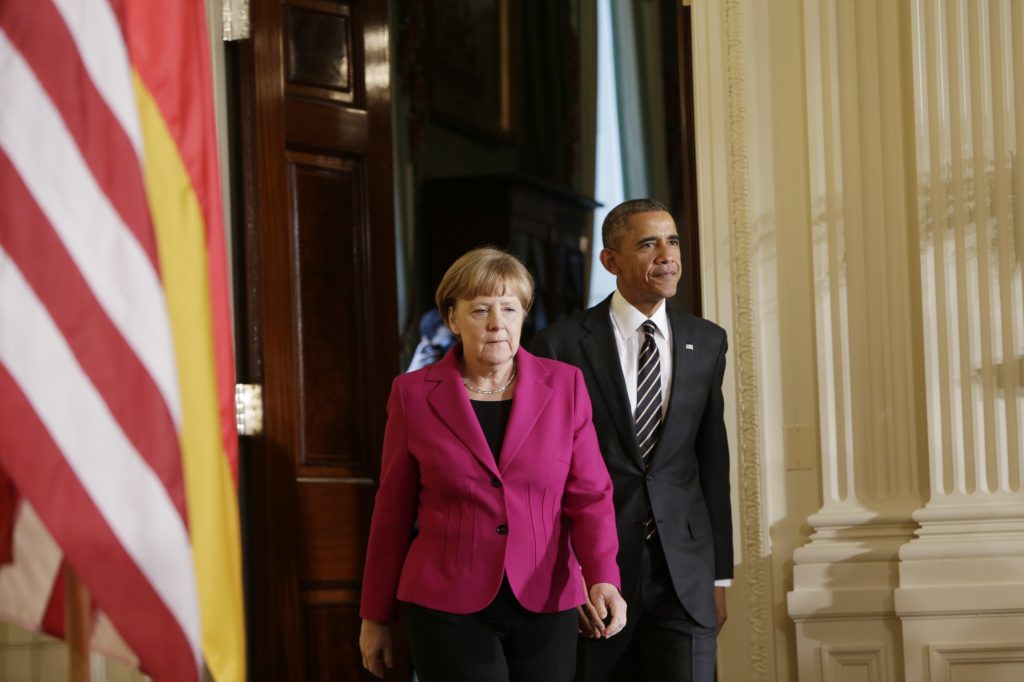
Europe Signals New Negotiation With Kremlin Will Not Include New Pressures on Kyiv
The Obama-Merkel summit was critical for maintaining Transatlantic unity in the face of Moscow’s escalating aggression in Ukraine. While skeptical of the Kremlin’s intentions, German Chancellor Angela Merkel would like to try another round of diplomacy to stop the fighting. That is why she accompanied French President Francois Holland to Moscow last week and why she has pushed for another negotiating round in Minsk this week. President Obama demonstrated support for the chancellor’s efforts yesterday when he noted his preference for a diplomatic ending to the crisis.
Reflecting the growing sentiment in Washington and in his own administration for sending defensive lethal equipment to Ukraine, however, the president stated that if diplomacy fails, he will be looking at other ways to persuade Russian President Vladimir Putin to end his aggression in Ukraine. Chancellor Merkel noted her opposition to sending weapons to Ukraine, but stressed that whatever decision is taken, the alliance between the U.S. and Europe will continue to be solid. In other words, if President Obama decides to send weapons to Ukraine, the U.S. and Germany will continue to work closely on Ukraine and other key issues.
This formulation between the president and the chancellor clears the way for President Obama to make the decision to send defensive, lethal weapons to Ukraine if the Minsk talks yield nothing. [Chancellor Merkel “needs to have this last, rather impressive bout of negotiations in order to bring her political constituencies with her should she chose after Minsk to make a different decision,” said Fran Burwell, the director of the Atlantic Council’s Transatlantic Relations Program.]
In New Talks, No New Pressure on Kyiv
From conversations in London and Paris, I believe that the Europeans will not press Ukraine to make major new concessions in the Minsk talks. As one well informed interlocutor put it, a new Minsk agreement – if reached – should not be more onerous for Ukraine than the earlier one.
If President Putin decides, for tactical reasons, to accept a new formula that does not provide him additional advantages, focus will turn immediately to implementation. Washington and European capitals understand that Moscow did not fulfill any major commitment under the first Minsk agreement back in September.
If President Putin agrees to a new peace agreement in the new Minsk talks, which now are scheduled for tomorrow, February 11, such a development might thus delay a decision by President Obama to send arms to Ukraine.
Europe’s Traditional Caution
The US-European talks follows a decades-old pattern in European security crises. In these, the United States typically has taken the lead in defining threats to the Transatlantic community and in proposing the necessary responses.
For months, the Obama administration has been reluctant to offer Ukraine weapons for its defense. But Washington, with Congress in the lead, has now moved in that direction, understanding the gravity of President Putin’s threat to undermine the international laws and the European consensus that have built Europe’s longest period of peace and prosperity since the Roman era.
The American move toward arming Ukraine has provoked debate in Europe, as vigorous American action to enhance the security of the continent always has done. That debate was audible at last week’s Munich Security Conference. There, as previously, it was clear that a good number of NATO leaders understand completely the dangers of President Putin’s policies and the need for a strong response. Perhaps that is because many of them, as Eastern Europeans, they live in his neighborhood.
Sympathy for Merkel
It is hard not to admire and sympathize with Chancellor Merkel. She has worked tirelessly since this crisis began to find a satisfactory diplomatic solution by engaging President Putin at every instance. This engagement has not proved successful thus far, including in her trip last week to Moscow.
At the same time, Chancellor Merkel heads a country with great economic ties to Russia and a people who have gotten used to a prosperous life without the threat of war. That prosperity is the product of the European Union, which has greatly diminished the prospects of war in Europe and promoted economic growth. The German people, or at least the young among them, have come to accept this as the natural order of things, rather than the historical anomaly that it is.
It is only natural that people prefer to avoid seeing a danger to their comfortable lives. Thus, many Germans and other Europeans have tended to see the Ukraine crisis as a peculiar, messy affair with no larger meaning for Europe. Up to now they have been broadly willing to overlook:
- the clear, abundant proof that the Ukraine violence is a war of Russian aggression;
- the openly stated Kremlin doctrines that could justify aggression in every country with a large Russian-speaking minority (including our NATO allies in the Baltics); and
- the fact that the Kremlin recently has seized territory from two countries and committed provocations against others.
So it is hard for Chancellor Merkel to find a political course that recognizes Kremlin responsibility for the growing bloodshed, and that also elicits support in Germany for policies necessary to stop, or at least limit the bloodshed. This backdrop only highlights her skill and determination in standing firm on sanctions—and it helps explain her concerns about providing weapons.
With their agreement yesterday, Chancellor Merkel and President Obama have given some time for her latest diplomatic effort to play out, and laid the ground to sustain the critical U.S.-European unity against President Putin’s aggression should the United States begin to provide Ukraine with the weapons it has been seeking to defend itself.
John E. Herbst is director of the Dinu Patriciu Eurasia Center at the Atlantic Council. He served as the U.S. ambassador to Ukraine from 2003 to 2006.
Image: German Chancellor Angela Merkel and President Barack Obama arrive to address a joint news conference in the East Room of the White House in Washington, on February 9. (Reuters/ Gary Cameron)
